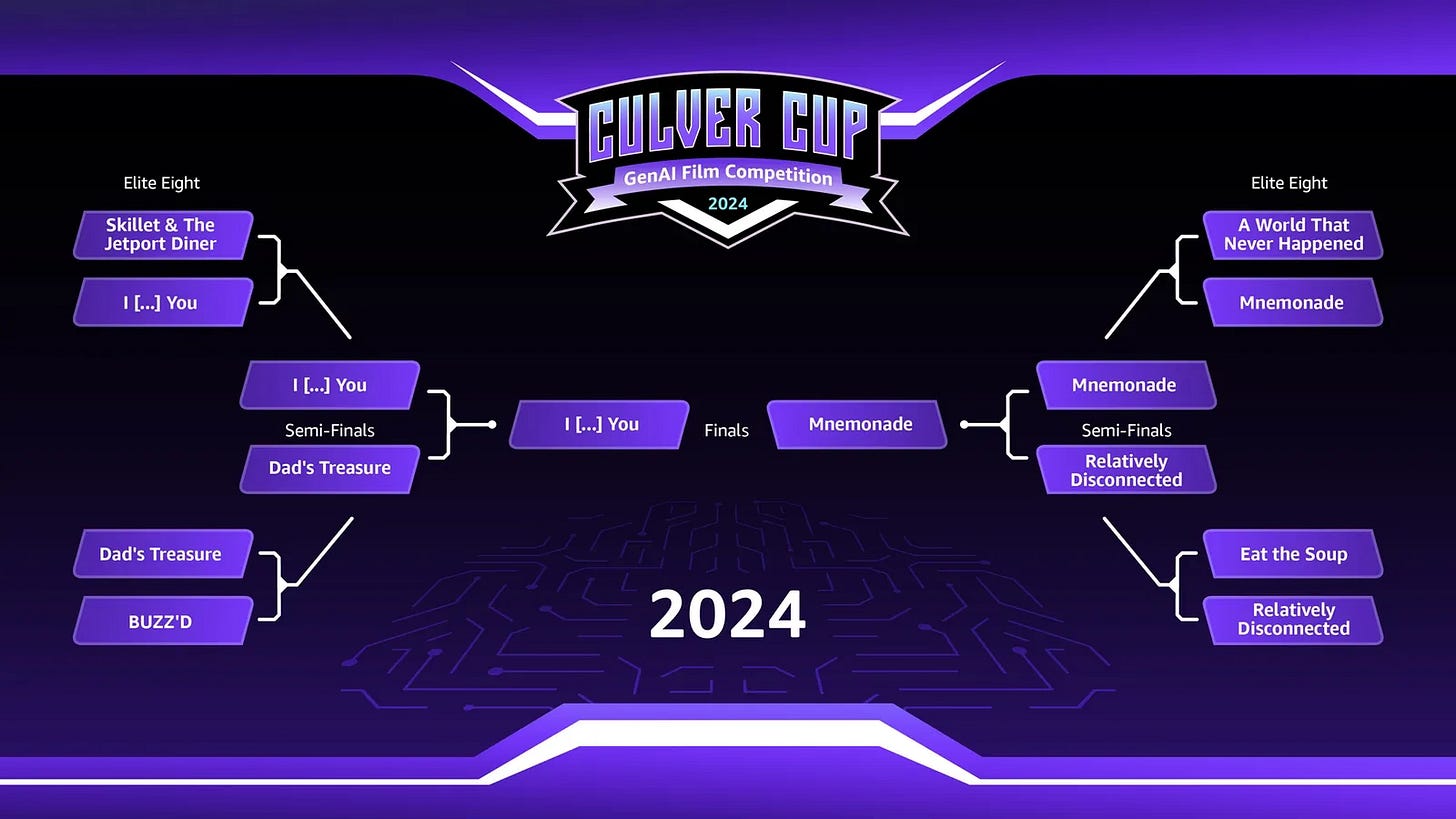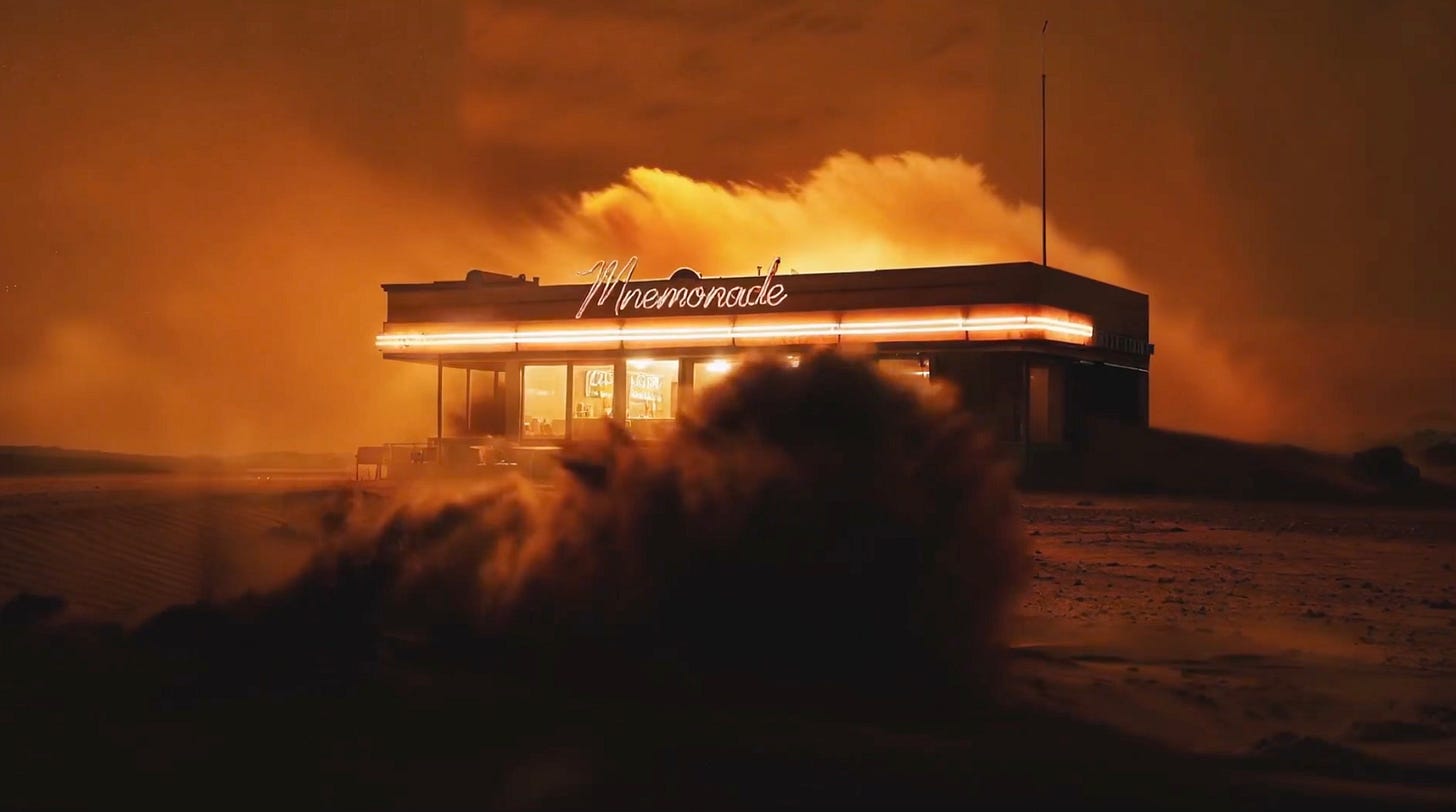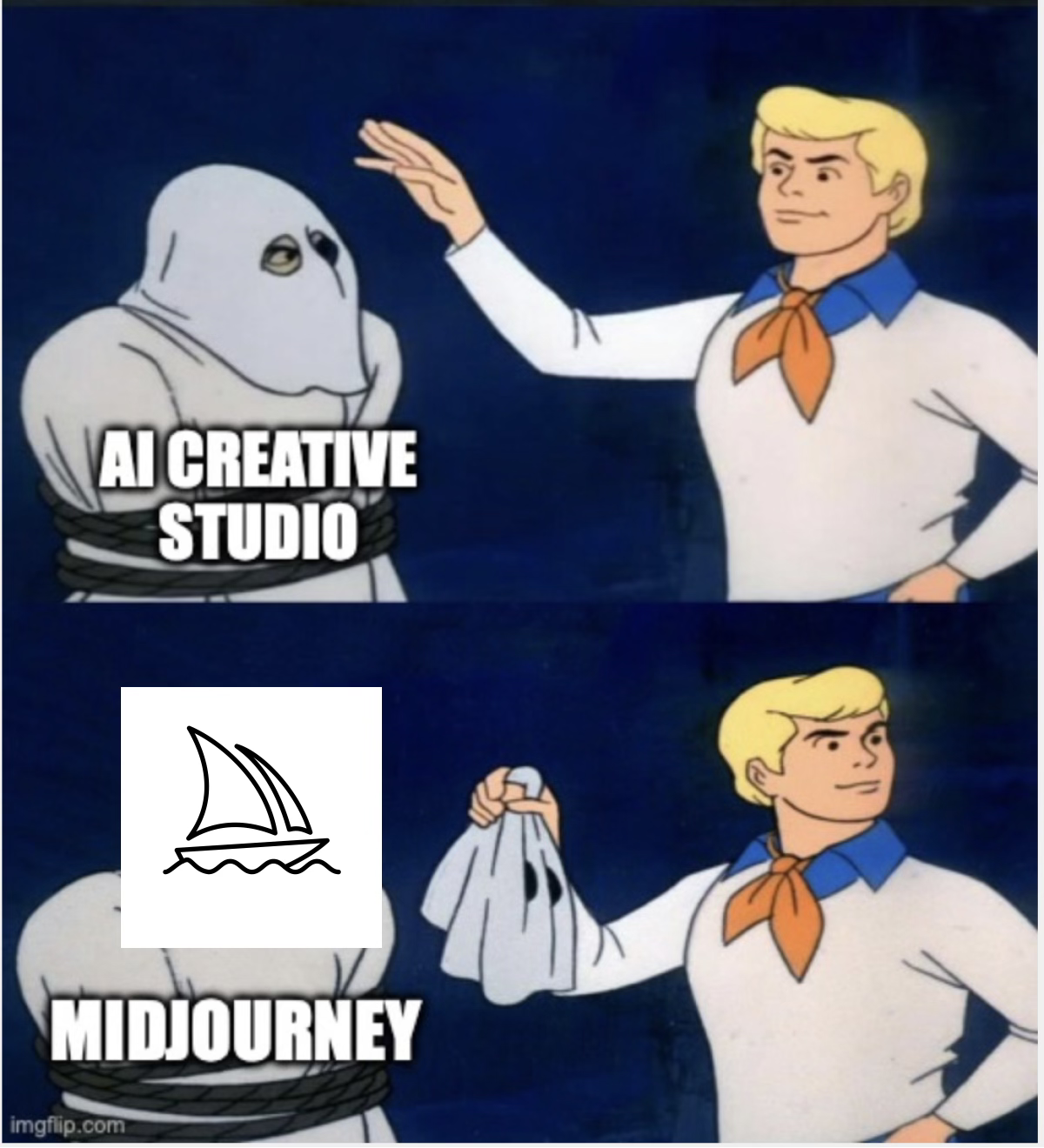One big room full of hopes and schemes
An anecdotal report of a major AI film screening and the reception that followed.
The casual reader can delight. For this, this is a casual column. Some meandering paragraphs about a few concerns.
Today I’m writing about the Culver Cup, a very good screening of generative films.
It was noteworthy because:
The films were good
The crowd was indicative
And afterwards I felt that tickle of unexpressed feelings.
I’ll write about each.
The Films
Some quick context. The Culver Cup is a contest that selected fifty filmmakers to create fully generative AI films based on a loose treatment by director David Slade. I previously mentioned the contest when I wrote about Slade’s encouragement for filmmakers to take generative AI seriously as a new form.
During LA Tech Week, the ‘Elite 8’ of these fifty films were screened for an audience of a few hundred people at the Culver Theater.
I didn’t like every film. Indeed, I’d be suspicious of people who extol everything of anything— AI films included. Only an auctioneer, Oscar Wilde quipped, admires all works of arts. And when you mix Hollywood and Silicon Valley in a room, you’re more often than not talking to an auctioneer. But more on that later.
I was, however, surprised at how many of the films I did enjoy. AI filmmaking has come a long way in the last two years. All these films had characters, plots, stories, and looked good. Two films in particular struck me as legitimate milestones in the field. Or more precisely, legitimate milestones in my anecdotal experience of watching AI films.
The one about dementia & sand
Mnemonade was directed by a veteran commercial video editor who now goes simply by “MetaPuppet”. The film had the most sophisticated workflow of the bunch and relied on the visual motif of scenery disintegrating into sand. Disintegrating sand-lapses is exactly the sort of visual that AI does well.
Mr. Puppet’s self-professed goal was to make a film that made people cry. And several people did.
Mission accomplished, Mr. Puppet.
You can read his very smart written statement about the film here.
The one about unrequited love
I […] You was directed by Maddie Hong and executed a simple concept very well. It dramatized the time between first professing “I love you” and the wait for reciprocation.
Maddie has directed films before, but remarkably she only started using generative AI tools a few months ago. Maddie is a story I expect we’ll see more and more often: a talented artist who suddenly found it’s much easier to work in the medium of film.
Now it’s almost a rule of festivals that your favorite entry doesn’t win. But here my two favorites won first and second.
I also liked a film called Buzz’d, which stood out to me as the most complete piece. It could be shown without qualification to viewers and they would not guess it was made with AI. Though I suspect it may have relied rather heavily on pre-existing 3D assets.
After the screening, each of the six contest judges (tech CEOs and filmmakers) stood up and made a statement about AI film. The statements were positive, encouraging, and each exceeded several minutes in length. As a rule, people have a lot to say about the space.
The author leans back and cracks his fingers, preparing to add an additional 800 words to the ‘casual’ column.
The Reception
After the screening we spilled into the lobby for a reception. Surrounded by three-hundred people discussing AI film, you realize how much hope and how much delusion exists around the topic. And it’s not always easy to discern between the two.
The refrain in a room like this is “AI will democratize filmmaking”. I certainly believe that. But when repeated by so many people it creates an atmosphere of indiscriminate enthusiasm. Any combination of AI and film is clever, a good idea, and bound to bring success to its progenitor.
In reality, these ideas exist on a spectrum. Some are good. Some are bad. And most are just murky at the moment. The room represented the full range. I’m tempted to say the spectrum started at the Shatner-in-a-Box, a refrigerator-sized display which had an AI William Shatner hologram inside. I can report this is the biggest AI-in-a-box I’ve seen to date, which I maintain as a category is rarely a good idea. Shatner-in-a-Box was no exception. He struggled to hear over the room’s booming echo, his own volume limited, and he was shortly left ignored in the corner. He hasn’t learned how to do the brand of yell-talk necessary at noisy receptions.
A few feet away, a shy editor looked at my feet as he wondered whether an obscure new 3D tool would allow him to achieve a specific shot in his space opera short film. He looked up at me hopefully, but I couldn’t offer much besides vague encouragement. He’d been working on his space opera concept for over five years and was committed to doing it with AI now— as a proof-of-concept, a finished product, he didn’t care. He was committed to making it. And in these tools he saw a chance.
A few minutes later I found myself under the intense eye-contact of a blonde woman pelting me with proper nouns. She was listing AI filmmakers she represented, each name pronounced with the certainty that I’d heard it before. Though most were unfamiliar to me, it didn’t stop the barrage of new names, brand projects, and affiliations with other proper nouns they were cultivating. The thick business card she’d handed me specified she was a talent agent who ran a boutique firm.
She was on a recent acquisition spree of AI talent, signing as many artists in the space as she could find. While she wasn’t sure about AI implications in the film industry, she was entirely sure that she could make money selling these filmmakers to ad agencies. I think she is correct.

Now, there’s a strange oversight one encounters in a lot of these conversations. When people say AI will democratize filmmaking, they often miss half the idea. Namely, that if filmmaking is democratized, it will be democratized for everyone. Not just them. Which means conventional success based on a traditional entertainment industry (like creating a widely syndicated show) will probably be an outdated idea. There are serious revenue, distribution, and scarcity issues to work out if AI’s promise to democratize film production holds true. And no one’s solving them currently.
As I talked with a man who had driven three hours to attend the event, I considered this awkward truth. He was, unsurprisingly, reporting to me that AI would democratize filmmaking. Only a few breaths later he was explaining how he was going to use MidJourney to start a branding consultancy that would make logos and marketing assets for high-paying clients, a particular line of work he had no previous experience in.
It seems to me self-evident that if your secret sauce is a publicly available AI model, it will likely be a sauce with a limited shelf life. I don’t report this anecdote in a condescending or mean-spirited way. I wish the entrepreneurial bunches of the room all the best. I share the conversation because the experience is quickly becoming a conversational meme for me. AI makes X so easy! I will do X with AI and charge a lot of money for it.
I’ve lived the meme as well. Recently an opera composer emailed me to commission AI-generated marketing assets for her opera production. I said sure. Six hours later she emailed me to let me go, explaining she was ‘messing around with Google Gemini’ and wanted to see what she could do on her own. That kind of work is not where I make my bed, but it was an instructive experience to see.
Easy come, easy go.
By the bar, I sat down with a friend who is making an AI village. He vibrated with laughter as he declared he wished he was at home right now, right this very instant, working on the project he loved. His passion is palpable. He sees more possibility for his artistic impulse than ever before.
There’s certainly promise. A bunch of us are in a fancy theater lobby, drinking for free on Amazon’s tab. And the films are getting better. Something about this room is promising.
Everybody here can execute their ideas more easily. Which makes the motivations matter more than ever. If you want money or fame, that will become more and more elusive in the film industry. So you can’t help but wonder who will get what they want. Who’s delusional and who’s correct. I flip through the night’s conversations.
The agent is right for now. Brands will pay for expertise in AI.
The 3-hour commuter’s thinking seems wishful.
The shy editor will probably complete his long-desired space opera. But he shouldn’t expect a Syfy original series from it. Fortunately, he doesn’t seem to.
As a general rule, I think the people interested in creating for creation sake will have a lot of fun. The people looking for a competitive edge will find AI video production quickly commoditized. And the people looking for traditional artistic celebrity will perhaps find it was a short-lived phenomenon from the age of mainstream media. To be clear, this technology means very different things for film economics than it does for culture of filmmaking.
But the assignment tonight is to be excited regardless. Optimism comes with a dose of self-deception. It’s part of the territory. In fact, it’s probably necessary to move things forward in a frontier space.
As I scan the room, I see a bashful Maddie being swarmed by a train of admirers. This guy’s starting a company. She’s starting a brand. Everyone around you is launching an enterprise. Or multiple.
As any new field, it’s full of pioneers.
Some want gold. Some want adventure. Some want to get away from where they were before.
As I’ve said before, it’s a noisy birth ward. And it’s hard to tell how it’s growing up.









For anyone curious, you can watch the 8 Culver Cup finalist films here: https://escape.ai/profile/culvercup
…thanks for the recap…been experimenting with the tools “because we have to” and it still feels like i am in the phase where this is shiny objects and fun toys…the utility of runway seems more novel than productive…but it is all closer and closer to manageably assistive or replacement level to several aspects of daily production…moving sideways or moving forward?…